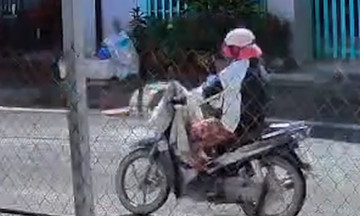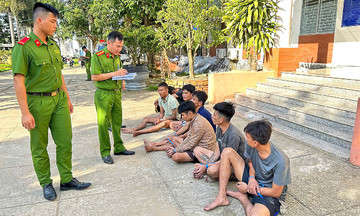The Vietnam Computer Emergency Response Team (VNCERT) under the Department of Cybersecurity and High-Tech Crime Prevention (A05, Ministry of Public Security) reported signs of attacks and intrusions by criminals to steal personal data at the CIC on 10/9.
The Ho Chi Minh City Police Department's Criminal Investigation Division believes that if criminals possess data such as citizen identification numbers, phone numbers, bank accounts, and credit history, online fraud groups will deploy many modified tricks.
Impersonating banks, CIC, or government agencies: criminals call, text, or email with accurate names, citizen identification numbers, and account numbers to create a sense of legitimacy.
The content is usually about "accounts at credit risk," "bad debts that need to be handled," or "the need to re-verify information to avoid account lockout," then leads victims to click on fake links or provide one-time passwords (OTPs).
Loan, due date extension, and credit limit increase scams: students and workers are easy targets, often through advertisements for "quick loans" or "bad debt reduction."
Criminals will use the excuse that "your CIC information has bad debt and you need to pay a fee to clear it," which is essentially a way to steal money or obtain more data.
Impersonating relatives or colleagues: with readily available detailed information, criminals can easily combine information and impersonate relatives, leaders, or colleagues to ask for money transfers.
Making legal threat calls: criminal gangs often impersonate the police, the procuracy, or the court, announcing that "you are involved in a money laundering case through the bank and your account needs to be frozen," then forcing victims to provide passwords and transfer money to a "safe account."
Spamming malicious SMS, Zalo messages, and emails: with large amounts of data, criminals can launch fake bank message campaigns, asking for "information verification as requested by CIC," attaching links containing malware to steal more data.
Who are the targets?
According to the investigative agency, high-risk groups include:
Students: easily lured by tuition loan packages, quick-paying part-time jobs, and credit limit increases.
Workers and office staff: often receive emails or messages announcing fake bad debts or credit warnings.
Elderly people with limited technology understanding: easily deceived by calls impersonating banks or the police; lacking skills to check links and applications.
People with limited IT knowledge: at risk of clicking on strange links, downloading fake apps, leading to loss of login information.
The Criminal Investigation Department advises people to be especially vigilant and adhere to the following principles: banks, CIC, and the police never ask for passwords or OTPs via phone or links.
Do not click on links in strange SMS, Zalo messages, or emails; only log in through official apps or websites.
If you receive a debt collection or account freeze call, verify it through the official hotline or by directly visiting a bank branch or relevant authorities.
Do not transfer money for "verification" to unclear accounts.
Students and workers should absolutely not believe advertisements about "clearing CIC debt" or "quick loans with 0% interest."
Elderly people need guidance from their families on how to refuse strange calls and only contact the bank directly when necessary.
Regularly update recommendations from the police, banks, and reputable media.
Quoc Thang












